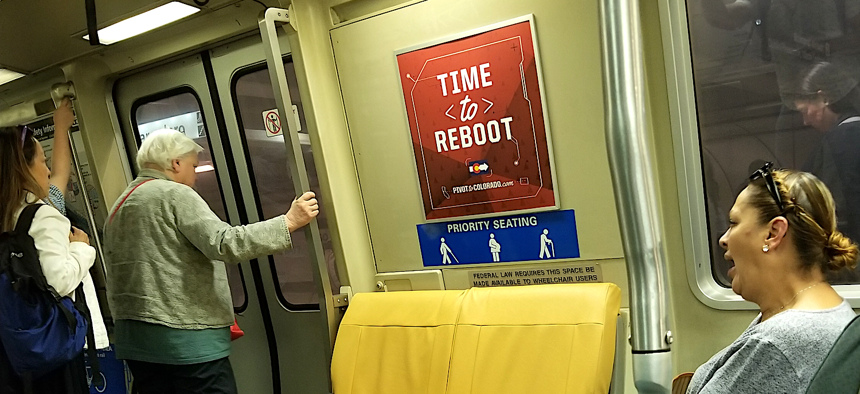Tech-Minded Colorado Has a Bay Area ‘Poaching Strategy’

The Pivot to Colorado promotional campaign was deployed to the Bay Area Rapid Transit rail system. Shutterstock

Connecting state and local government leaders
Those scraping by on six-figure salaries in Silicon Valley may be enticed by this ad campaign.
SAN FRANCISCO — As a BART train pulled into the Embarcadero station on Tuesday afternoon, the doors opened and enough commuters got out to reveal an ad campaign that simply reads “Time to Reboot” with a website address for Pivot to Colorado.
But it’s not a tourism promotion meant to get Bay Area residents to temporarily spend time and money in the Centennial State. It’s a “poaching strategy,” according to the Pivot to Colorado website. The $500,000 campaign was developed by the Colorado Technology Recruiting Coalition, a public-private partnership promoting economic development in a place that has no shortage of tech jobs.
As The Denver Post noted in April when the campaign launched, Pivot to Colorado does trumpet the state’s lower cost of living compared to the Bay Area, but not its lower housing prices specifically.
The state’s economic development office, which is a member, says that Colorado has 11,000 tech companies. But other than citing “lower cost of living,” there’s no mention that Denver’s median home price, while it has been climbing rapidly, remains 60 percent less than San Jose, Calif.—$407,100 vs. $1.1 million, according to February prices tracked by Zillow.
Similar economic development campaigns have been more direct on housing cost comparisons. In 2015, economic development boosters in Columbus deployed a campaign in Washington, D.C. touting its coolness factor and lower cost of living compared to the nation’s capital.
As District Measured, a blog by the District of Columbia’s Office of Revenue Analysis, pointed out at the time, the difference in cost of living might not make decamping for Columbus as appealing as promoted.
Living in Columbus isn’t going to save a typical millennial as much as you might expect. Housing is much cheaper in Columbus but millennials in D.C. tend to make a lot more money. The result is that in both places a typical millennial renting a one-bedroom apartment would have about $30,000 left over for other expenses (before taxes). In Columbus this would go further, but not much—we estimate it’d be like having around $36,000 to spend in D.C. But this difference might be negligible since many D.C. millennials reduce their costs by having roommates and not owning cars.
As more tech workers in Silicon Valley and elsewhere in the Bay Area grumble over sky-high housing costs and how they’re “scraping by” on six-figure incomes, places like Denver and Boulder seem more and more appealing and are perhaps worth a closer look.
Michael Grass is Executive Editor of Government Executive’s Route Fifty and is based in Seattle.

NEXT STORY: San Francisco City Attorney’s Subpoenas Put New Pressure on Uber, Lyft



